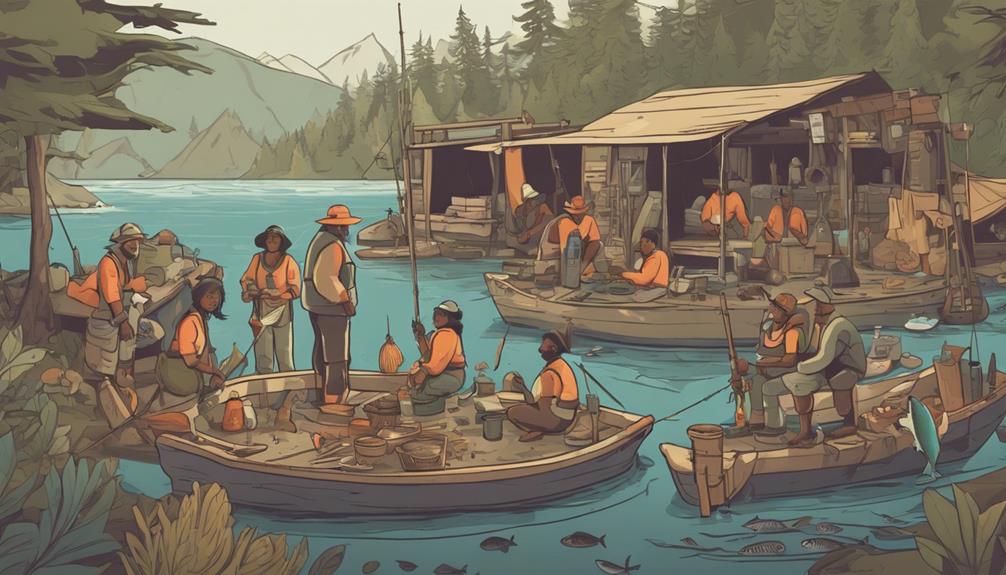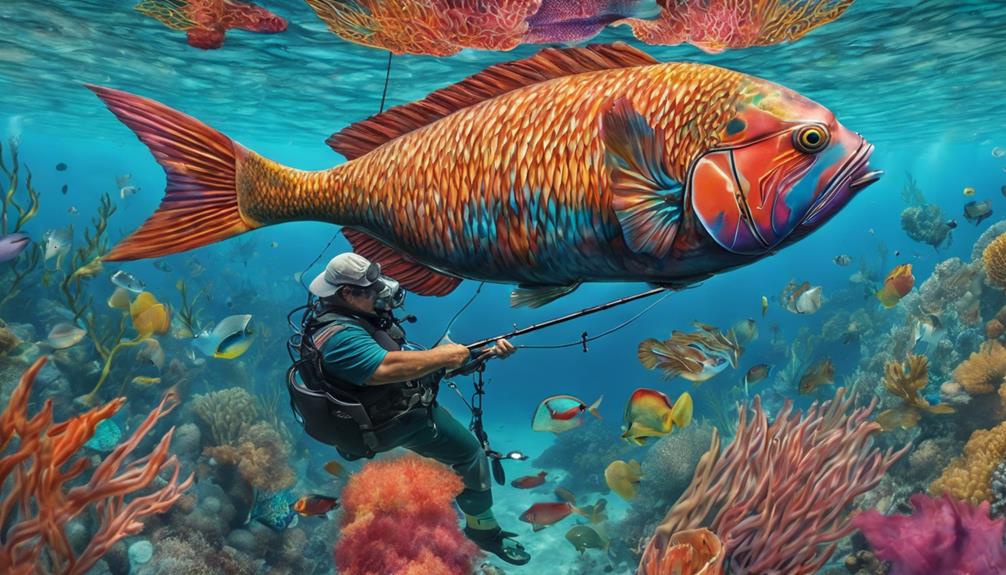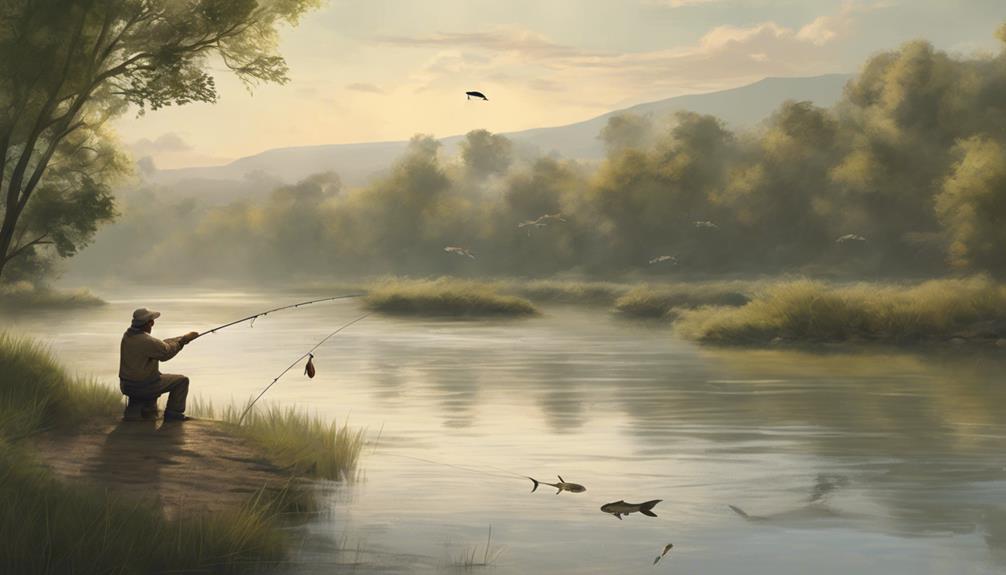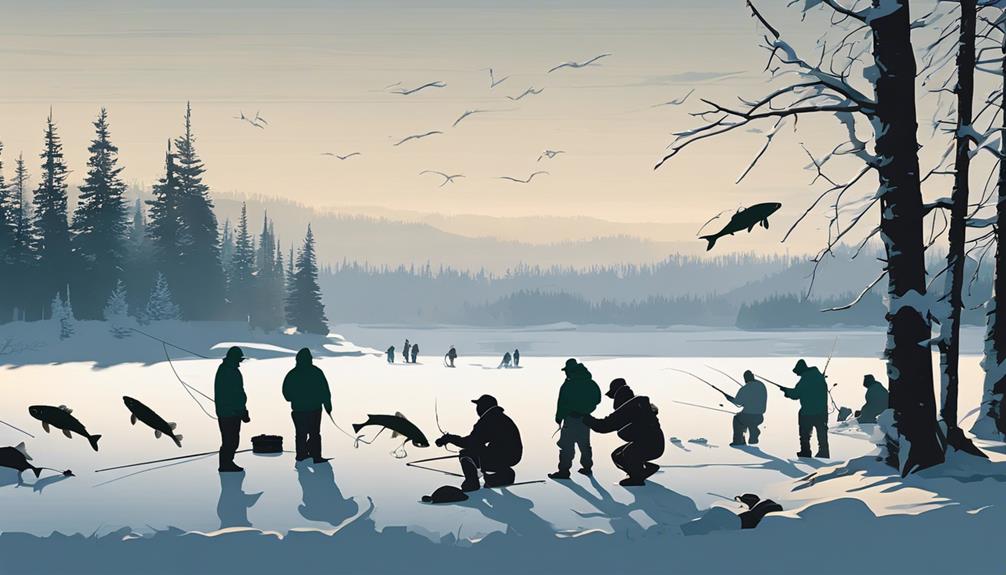So, you think you know everything there is to know about fishing camps and workshops, huh? Well, think again. When it comes to species-specific fishing, there's a whole world of secrets waiting to be uncovered.
From the elusive behavior of different fish species to expert techniques that can elevate your game, there's a wealth of knowledge that could take your fishing skills to the next level.
Intrigued? Keep on discovering the hidden gems that can revolutionize your fishing experience.
Benefits of Species-Specific Fishing Workshops
Discover the advantages of honing your angling skills through specialized workshops focused on specific fish species. These workshops offer a unique opportunity for skill improvement, allowing you to enhance your techniques and knowledge in targeting specific types of fish. By participating in these workshops, you not only refine your abilities but also gain valuable insights and specialized knowledge that can elevate your fishing game to the next level.
One of the key benefits of attending species-specific fishing workshops is the opportunity for skill improvement. These workshops are designed to cater to anglers looking to enhance their abilities in targeting particular fish species. Through hands-on training and expert guidance, you can refine your techniques and strategies, ultimately becoming a more proficient angler.
Moreover, species-specific fishing workshops provide excellent networking opportunities. You get to connect with like-minded individuals who share your passion for fishing. By interacting with fellow anglers and instructors, you can exchange valuable tips, tricks, and experiences, further enriching your fishing knowledge.
In addition to skill improvement and networking opportunities, these workshops offer unique experiences that you won't find elsewhere. From learning about the behavior and habitats of specific fish species to mastering the art of lure selection, each workshop is filled with exciting and educational moments that can broaden your fishing horizons. Embrace the chance to delve deep into the world of a particular fish species and watch as your angling skills flourish.
Top Fish Species for Workshops
When selecting fish species for workshops, it's essential to focus on those that are popular among anglers and offer unique challenges and learning opportunities. Two top fish species that stand out for workshops are bass and trout fishing.
Top Fish Species for Workshops:
- Bass Fishing: Bass fishing is a favorite among anglers due to the aggressive nature of these fish. Workshops focused on bass fishing can teach participants about different bass species, various techniques like topwater fishing or flipping and pitching, and how to locate bass in different habitats.
- Trout Fishing: Trout fishing is another popular choice for workshops as it requires finesse and skill. Participants can learn about the different types of trout such as rainbow, brown, and brook trout, as well as the specific equipment and bait needed for successful trout fishing. Techniques like fly fishing or bait fishing in streams and rivers can also be explored during these workshops.
Selecting these top fish species for workshops ensures that participants have the opportunity to learn valuable skills, techniques, and knowledge specific to each species, enhancing their overall fishing experience.
Choosing the Right Fishing Camp
Opt for a fishing camp that aligns with your skill level and desired experience to make the most of your angling adventure. When choosing the right fishing camp, consider the importance of finding camaraderie among fellow anglers. A camp where you can connect with like-minded individuals who share your passion for fishing can enhance your overall experience. Whether you're a beginner looking to learn from others or an experienced angler seeking to exchange tips and tricks, the camaraderie found at the camp can make your trip more enjoyable and rewarding.
Expert guidance is another crucial aspect to consider when selecting a fishing camp. Look for camps that offer knowledgeable instructors or guides who can help you improve your fishing skills. These experts can provide valuable insights, techniques, and personalized advice that cater to your specific needs. Learning from seasoned professionals can significantly enhance your fishing abilities and make your time at the camp more fulfilling.
Before making a decision, research different fishing camps to ensure they cater to your skill level and objectives. Reading reviews and testimonials from previous participants can give you a better understanding of what to expect. By choosing a camp that offers camaraderie and expert guidance, you can set yourself up for a successful and enjoyable fishing experience.
Tips for Successful Workshops
To enhance your workshop experience, prioritize active participation and engagement with the material presented. Effective workshop organization and participant engagement are key to a successful learning environment. Here are some tips to make the most out of your workshop:
- Workshop Organization: Ensure the workshop is well-structured with clear goals and objectives. A well-organized workshop will help you stay focused and make the most of the learning opportunities presented.
- Participant Engagement: Actively participate in discussions, ask questions, and share your experiences. Engaging with both the facilitator and other participants will enrich your learning experience and provide different perspectives to enhance your understanding of the material.
- Facilitator Expertise: Take advantage of the facilitator's expertise by asking for clarification on complex topics or requesting additional examples to deepen your understanding. A knowledgeable facilitator can offer valuable insights and guidance to help you grasp the concepts being presented.
Interactive sessions are also essential for a successful workshop. Engage in group activities, participate in hands-on demonstrations, and collaborate with other participants to apply the knowledge in a practical manner. By actively engaging with the workshop content and facilitator, you can make the most of the learning experience and walk away with valuable skills and insights.
Essential Gear for Species-Specific Fishing
Having the right gear is crucial for successful species-specific fishing expeditions. When gearing up for your next fishing trip, take time to consider your rod selection, bait choices, reel maintenance, and casting techniques.
Rod selection plays a vital role in species-specific fishing. Different fish species require different rod types based on their size and behavior. For example, if you're targeting larger fish like Muskie or Pike, a heavy-action rod with enough backbone to handle their strength is essential. On the other hand, for more finesse fishing targeting species like Trout or Crappie, a lighter rod with sensitive tip action is preferable. Matching your rod to the targeted species can significantly increase your chances of success.
Bait choices are another critical aspect of species-specific fishing. Understanding the feeding habits of the fish you're targeting will help you select the right bait. Whether it's live bait, artificial lures, or flies, knowing what entices the fish you're after is key. Experimenting with different baits can also help you determine what works best in specific conditions.
Maintaining your reel in top condition is crucial to prevent malfunctions during your fishing trip. Regularly cleaning, lubricating, and checking for any damages can extend the life of your reel and ensure smooth operation. Additionally, practicing different casting techniques such as overhead casting, pitching, and flipping can improve your accuracy and distance, increasing your chances of a successful catch.
Understanding Fish Behavior
Understanding fish behavior is crucial for increasing your success in species-specific fishing expeditions. By delving into the intricacies of how fish behave, you can significantly enhance your fishing techniques. Here are some key aspects to consider:
- Fish Feeding: Understanding when and what fish feed on is essential for successfully catching them. Different species have varying feeding habits, such as surface feeding, bottom feeding, or feeding at specific times of the day. By knowing the feeding patterns of the fish you're targeting, you can choose the right bait and fishing method to attract them effectively.
- Migration Patterns: Fish species often follow specific migration patterns based on factors like water temperature, spawning cycles, or food availability. Knowing the migration routes and timing of the species you're interested in can help you position yourself in their path, increasing your chances of a successful catch.
- Behavioral Cues: Observing subtle behavioral cues, such as ripples on the water's surface, jumping fish, or sudden changes in movement patterns, can provide valuable insights into where the fish are located and their current activity levels. Paying attention to these cues can help you adapt your fishing strategy on the spot for better results.
Expert Techniques for Different Species
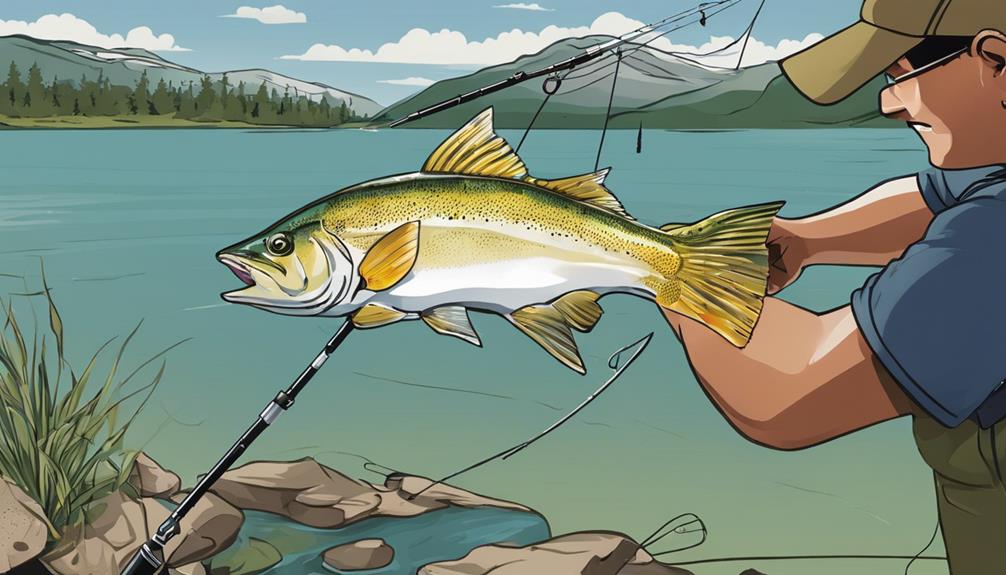
Explore advanced methods tailored to specific fish species for maximizing your fishing success.
When it comes to bait selection, understanding the preferences of the species you're targeting is crucial. For example, if you're going after bass, using live bait like worms or minnows can be highly effective. On the other hand, for trout, artificial lures such as spinners or flies might yield better results. Experimenting with different baits and observing which ones the fish respond to can significantly increase your chances of a successful catch.
In addition to bait selection, mastering reeling techniques specific to each species can make a big difference in your fishing outcomes. For instance, when fishing for pike, using a jerking motion while reeling can mimic injured prey, enticing the pike to strike. Conversely, when targeting catfish, a slow and steady retrieval with pauses can attract these bottom-dwellers to your bait. Understanding the behavior and feeding patterns of the species you're after is key to adapting your reeling techniques effectively.
Conservation Practices in Fishing Camps
To ensure the sustainability of fishing resources, implementing effective conservation practices in fishing camps is essential. Sustainable practices are crucial to minimize the environmental impact of fishing activities. By adopting sustainable practices such as catch-and-release policies, reducing waste, and using eco-friendly gear, fishing camps can help preserve aquatic ecosystems for future generations.
Sustainable Practices: Encouraging responsible fishing practices like catch-and-release not only helps in maintaining fish populations but also promotes a healthy ecosystem. Minimizing the use of single-plastic items and opting for reusable or biodegradable alternatives can significantly reduce waste that may harm marine life.
Environmental Impact: Understanding the environmental impact of fishing activities is key to implementing effective conservation efforts. By educating camp participants about the importance of preserving natural habitats and respecting wildlife, fishing camps can foster a sense of responsibility towards the environment.
Conservation Efforts: Community involvement plays a vital role in conservation efforts. Organizing beach clean-ups, habitat restoration projects, or educational workshops within the local community can raise awareness about the importance of sustainable fishing practices and environmental conservation.
Incorporating sustainable practices, raising awareness about environmental impact, and engaging the community in conservation efforts are fundamental steps towards ensuring the long-term health of fishing resources and the ecosystems they depend on.
Frequently Asked Questions
How Do Species-Specific Fishing Workshops Contribute to the Preservation of Local Ecosystems?
When you attend species-specific fishing workshops, you not only improve your fishing techniques but also contribute significantly to the preservation of local ecosystems.
By learning about the specific species and their habitats, you gain a deeper understanding of the importance of biodiversity conservation.
These workshops serve as valuable platforms for conservation education, empowering you to make informed decisions that positively impact the delicate balance of your local ecosystem.
Are There Any Age Restrictions for Participating in Species-Specific Fishing Camps?
Age restrictions for species-specific fishing camps vary. Some camps may have age requirements to ensure safety and appropriate skill levels. Parental supervision might be mandatory for younger participants.
It's essential to check with the camp organizers beforehand to understand any age restrictions and supervision policies. Following these guidelines can help ensure a positive and safe experience for all participants.
How Do Fishing Camps Ensure the Safety and Well-Being of Participants During Workshops?
To ensure participant safety and well-being during workshops, fishing camps implement various safety measures. They prioritize participant care by maintaining a safe workshop environment and having clear emergency procedures in place.
These measures include providing proper supervision, first aid kits, and ensuring all staff are trained in emergency protocols. By focusing on safety, fishing camps create a secure environment for participants to enjoy and learn during their workshops.
Can Participants Bring Their Own Fishing Gear or Is It Provided by the Camp?
You can bring your own fishing gear to the camp or use the equipment provided. If you prefer using your personal equipment, make sure it meets the camp's guidelines for safety and effectiveness.
However, if you'd rather not bring your gear, the camp supplies everything you need to enjoy a successful fishing experience. Just let the camp staff know your preference, and they'll ensure you have the right gear options for a great fishing workshop.
Are There Any Opportunities for Hands-On Experience With Fish Handling and Preparation During the Workshops?
Yes, during the workshops at the camp, you'll have the chance to gain hands-on experience with fish handling and learn various cooking techniques.
This interactive approach allows you to develop essential skills for preparing and cooking fish.
The workshops provide an immersive learning environment where you can practice fish handling techniques and explore different ways to prepare your catch for a delicious meal.
Conclusion
Now that you know the benefits of species-specific fishing workshops, the top fish species to target, how to choose the right fishing camp, tips for success, essential gear, fish behavior, expert techniques, and conservation practices, you're well-equipped to unlock the secrets of these specialized camps.
By attending these workshops, you'll not only improve your fishing skills but also contribute to the conservation of our precious aquatic ecosystems.
So, what're you waiting for? Start exploring and learning at a species-specific fishing camp today!
